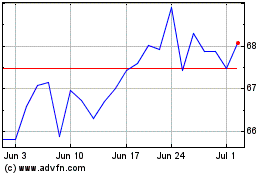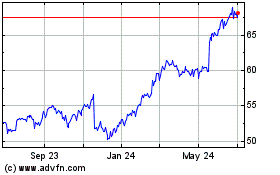Walmart Ruling May Test Probe Pacts -- WSJ
July 01 2019 - 3:02AM
Dow Jones News
By Dylan Tokar
This article is being republished as part of our daily
reproduction of WSJ.com articles that also appeared in the U.S.
print edition of The Wall Street Journal (July 1, 2019).
A legal dispute that arose during a seven-year foreign bribery
probe into Walmart Inc. may have a lasting impact on how companies
handle future investigations.
The dispute led to a ruling by the U.S. Court of Appeals for the
Fourth Circuit in Richmond, Va., last year that could make it
harder for companies to cooperate with the government while also
maintaining legal privilege over internal documents. Legal
privilege is a rule that protects the confidentiality of
communications between a lawyer and client.
The case centered on the types of agreements companies strike
with prosecutors when they decide to cooperate with a government
probe, including by making employees available for interviews and
sharing documents from their own internal investigations.
Walmart last week agreed to pay $282 million to resolve Foreign
Corrupt Practices Act violations in Mexico, India, Brazil and
China, in settlements with the U.S. Justice Department and the
Securities and Exchange Commission.
The company took a cooperative stance with the Justice
Department during the government probe, including by allowing
prosecutors to interview 18 current and former employees, according
to the court's judgment.
In exchange, prosecutors agreed that any information disclosed
by the employees that was covered by legal privilege would remain
so. Such arrangements, also known as non-waiver agreements, are
common in government investigations.
But when the Justice Department tried to subpoena the former
general counsel of a Walmart subsidiary to testify before a grand
jury about statements made during a voluntary interview, the
company balked, saying the subpoena sought privileged information,
according to the court's opinion.
The court ruled in Walmart's favor. "Declining to hold the
government to the terms of an agreement it struck would discourage
private entities from cooperating with the government in the
future," Chief Judge Roger Gregory and Judge Steven Agee wrote.
Since then, the Justice Department has been more reluctant to
make non-waiver agreements with companies, lawyers say.
"The government has pulled back from entering into agreements
like that, as a consequence," said Joan Meyer, a former government
prosecutor and a white-collar defense lawyer at the firm Pierce
Bainbridge Beck Price & Hecht LLP. That makes it harder for
companies to cooperate with the government and protect legal
privilege over documents created in the course of an internal
investigation, she said.
If the Justice Department stops handing out non-waiver
agreements, companies may stop sharing most privileged information,
Ms. Meyer said. Justice Department guidelines prevent prosecutors
from asking for privileged information or penalizing companies that
don't voluntarily share it.
The Justice Department relies on companies to disclose potential
violations and cooperate with investigators, especially
multinational companies that have encountered issues in far-flung
locations, she said. "It would be very difficult for the DOJ to
find out about it and then conduct a full investigation of that
problem without the cooperation of the company," Ms. Meyer
said.
The circuit court opinion doesn't name the company under
investigation, calling it X Corp., and doesn't specify the country
of the subsidiary at issue. X Corp. is Walmart, according to a
person familiar with the matter. A Walmart spokesman declined to
comment on the decision.
The case was argued by lawyers at Jones Day who also served as
counsel to Walmart in its internal probe into violations of the
FCPA and by prosecutors from the Justice Department's FCPA
unit.
The dispute may have remained a sore point between prosecutors
and Walmart. In last week's settlement, the Justice Department gave
the company full credit for its cooperation with the government's
investigations in Brazil, China and India. But it gave only partial
credit for Walmart's cooperation in Mexico, saying the company had
failed to prevent conflicts between its own investigation and the
department's with respect to one witness interview.
Bruce Searby, a former trial attorney in the Justice
Department's FCPA unit, said the dispute shows how the department
and a company can have different views on what cooperation means in
practice.
"It was a situation that the government set itself up for by
having an ambiguous non-waiver agreement," said Mr. Searby, who
said he didn't work on the Walmart case during his time at the
Justice Department. "But it also shows how the company's idea of
cooperation was very, very minimalistic."
"They wanted to limit the ability of the government to prove
facts in court that their own witness was telling them
voluntarily," he added.
Write to Dylan Tokar at dylan.tokar@wsj.com
(END) Dow Jones Newswires
July 01, 2019 02:47 ET (06:47 GMT)
Copyright (c) 2019 Dow Jones & Company, Inc.
Walmart (NYSE:WMT)
Historical Stock Chart
From Mar 2024 to Apr 2024

Walmart (NYSE:WMT)
Historical Stock Chart
From Apr 2023 to Apr 2024
